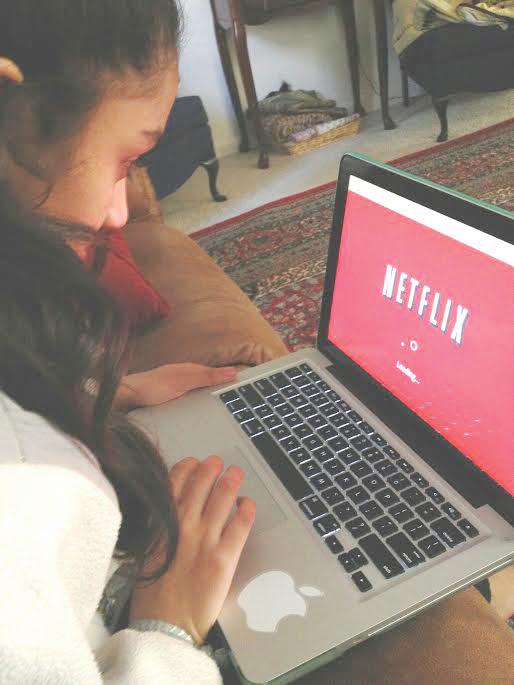Binge-watching: Are you addicted to your television?
With new season premieres of popular shows being released, many students are tempted to lounge around and watch the latest shows for several hours straight.
The rise of websites like Netflix and Hulu provide easy access to thousands of episodes of a plethora of television shows which makes binge-watching nearly irresistible.
Binge-watching is a term used to describe the process in which a person watches several episodes of a show for a longer period of time than usual.
It begins with the fairly innocuous two or three episodes back-to-back but can reach the extreme of watching full seasons in one day. However, many of us may be exposed to this time-consuming issue without fully understanding the effect it has.
Due to the highly accessible streaming services via the Internet, binge-watching may be hard for teens to avoid. The most current shows can easily be found online, allowing teens to watch TV on demand.
If they don’t happen to subscribe to a website like Netflix or Hulu, oftentimes big broadcasting stations like ABC post their recent episodes onto their very own websites for free.
Popular shows among teenagers are fairly different as there are a variety of genres that can range from horror to comedy. However, shows like House of Cards, American Horror Story, and Pretty Little Liars all have one thing in common: they distract students from completing schoolwork and are the primary culprits of daily procrastination.
“I usually end up doing schoolwork while I watch TV,” sophomore Maddie Schinstock said. “On average, [I] probably watch two or two and a half hours.”
Despite the fact that some students can multitask with a fair degree of success, many see their schoolwork begin to suffer as their attention rests more and more on the show they are watching. Watching TV while trying to concentrate on homework may be a challenging effort for some as it may distract them from completing an assignment.
A teen’s education is not the only thing that binge-watching may affect. Rather, their health may be compromised as well. Some teens stay up to the latest hours of the night, resulting in inadequate amounts of sleep and impaired sleeping schedules.
“In the past, I’ve stayed up to about 4 a.m,” Schinstock said. “One time, I watched an entire season of Criminal Minds, I think it started at six and went on until three.”
So, why do we binge-watch? Is it impatience? Is it because we can? A little bit of both. Before the age of streaming, it was impossible to binge-watch a TV show. Episodes would premiere weekly and a kid could really only watch the episodes once a week. The episode would end. The curiosity would build and viewers would be left anxious. Will Jane and Joe find it in their hearts to forgive each other? Will Bob help his brother find the cure? Tune in next week.
Websites like Netflix take away that curiosity and replace it with impatience. Suddenly, instead of one episode before you, there are eight seasons, and teens don’t know what to do with that. They will watch more than they usually would sitting in front of the TV.
“I sometimes use [television] as a distraction and tell myself I’m not putting [homework] off, but I really am,” sophomore Jess Ferson said. “If it’s a regular school day, sometimes [I watch] none, sometimes it could be two hours… If it’s a non-school day and I’m feeling lazy and uninspired and you know, like a teenager I could sit there for maybe like a solid eight hours.”
Even though bumming in sweatpants while watching a marathon of Grey’s Anatomy sounds like the perfect way to spend a long weekend, it probably isn’t what’s best. It’s important to take a stand against your binge-watching addiction and monitor the amount of television intake. Read a book. Do some homework. Be productive. Just don’t let TV control your life.

Active member in various honor societies and clubs, senior Julie Nguyen has been on The A-Blast staff for three years. She is currently the Health Editor...

Senior Sadie Modica has been on the A-Blast staff for three years. In addition to her responsibilities as Co-Editor-in-Chief, Sadie is an IB Diploma candidate...










